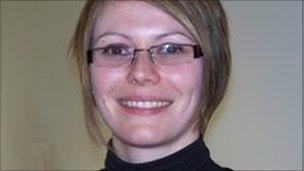Trial will see if mentors can help prevent diabetes
- Published
Researchers in Norfolk are beginning a £2m project to screen 10,000 people who are at high risk of type 2 diabetes.
Some people whose blood sugar shows they are at a "pre-diabetes" stage will be assigned mentors - patients who already have the condition.
The mentors will give other patients advice on diet and lifestyle - as well as getting support themselves from professionals.
WATCH: Rex Berry, who's been helped to reduce his risk of diabetes
The researchers describe the five-year project as "exciting".
The £2.2m study has been funded by the National Institute for Health Research.
GPs in Norfolk will write to patients who are aged over 40, have a Body Mass Index above 30 and a family history of diabetes, to ask them if they wish to take part in the trial.
Most participants are expected to have normal levels of blood glucose.
But researchers from Norfolk and Norwich University Hospitals expect that 11% of people will be in the "pre-diabetes" phase, which means they're at high risk of developing the condition.
About 50 people who already have diabetes will be recruited, and will be randomly assigned to act as mentors to some of the participants.

Nikki Murray, from Norfolk and Norwich University Hospitals
'Wonderful response'
Senior research associate, Nikki Murray, said: "There'll never be enough trained NHS staff to help all the people in Norfolk who have diabetes or are at risk of it.
"Using members of the public to help us is a novel aspect.
"We're hoping the mentors will build a strong rapport with the participants, because they know what it's like having to make lifestyle changes.
"It's a fantastic way for them to relate to each other in a way which some healthcare professionals won't be able to do."
Staff at the Norfolk Diabetes Prevention Study say they had a "wonderful response" from mentors in an earlier feasibility study.
Lethargy
Rex Berry, 69, took part in that work. Two years ago, he was told his blood sugar was at a pre-diabetes level.
Rex, a retired maths teacher from Wymondham, said: "It was a surprise to me. I've got no record of diabetes in my family and I felt I was reasonably fit.
"I thought 12 and a half stone wasn't too bad a weight, but I've lost a stone since then.
"The main difference I've made is to the urgency of my lifestyle.
"I'd been an active person - but I'd drifted into a sort of lethargy after I retired.
"When I got fit again and took up a weekly circuit training class, I realised there was no need for that slowdown.
"I got some urgency and fizz back into walking the dog and things like that.
"I was very pleased that I knew I was pre-diabetic, so I could do something about it."
Crucially, Rex was given advice and support over the phone by Terry Riches, 70, who was diagnosed with diabetes 17 years ago.
Conversation flows
Terry said: "People like me have experience of diabetes. I felt I could help someone else along.
"I've found that doing a lot of bending and digging in the garden can help get my blood count down - so I pass on advice like that.
"Once you've chatted with someone, you remember a bit about them and build a rapport. After that, the conversation just flows.
"I used to ask Rex how things were going, and whether he'd cut down on his cheese.
"We only spoke three or four times, but it's great to meet him now for the first time and to see that his excellent exercise regime has paid off!"